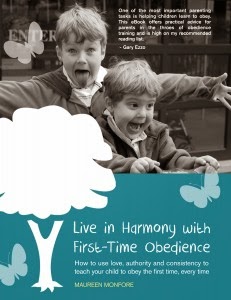Today is Babywise Friendly Blog Network day! Be sure to check out my post over on A Mother Far From Home 🙂
First-time obedience is something I think is very important in raising my children and I appreciate Maureen’s insight into how to achieve that goal! I needed this little kick in the booty to get working better with this with Britt now that she’s two 😉

Pave the Way for
Learning with First-Time Obedience
By Maureen Monfore, http://www.childwisechat.com
I have often talked about how our first-time obedience
training can pave the way for important moral training. When our kids aren’t
throwing tantrums or talking back to us with major attitude, they are open and
receptive to learning the moral and ethical ways of the world.
But this applies to learning academic subjects as well. I
recently ran across a quote, written from a teacher’s perspective, that says:
“If you fail to parent your children at home, then don’t expect
me to work miracles with them in the classroom.”
I don’t intend to spark a debate about whose job it is to
teach our children, but it is very clear to me that we can do a lot for our
kids at home if we want them to learn and succeed in school. Sure, we can put
them on the bus and not give a care about homework, but doing so only fails our
children.
In On Becoming
Preschoolwise and On Becoming
Childwise, the Ezzos tell us that we shouldn’t just sit back and wait to
ship our kids off to school at the appropriate age. There are important moral
and behavioral lessons we should teach them while they are still home with us.
First-time obedience and respect for authority stand at the center of these
lessons.
Specifically, we should instill these important traits in
our children before sending them off to school:
- Respect and obey all adults, especially those in
authority - Have empathy for other children (learn to share
and understand how your actions affect others) - Know that there’s a time for play and a time for
quietly sitting still - Work hard and always give it your best effort
What I love about the Babywise books is that they give us
specific, practical ways of teaching these lessons. If you have a child who
won’t sit still when told? Practice blanket time. Do it every day and he’ll
learn.
Do you have a child who gives adults a nasty look when they
tell him what to do? Nip that attitude in the bud. Tell him exactly why it’s
important to treat all adults with respect. Then let him see you live it. Give
up your seat to an elderly person on the bus. If you see an adult drop
something, have your child pick it up and hand it to him. Have your child rake leaves
for elderly neighbors. If he’s too young, do it together.
As for working hard and giving everything our best effort,
start with a simple coloring page. If your child scribbles all over the page,
crumple it up and throw it away. Keep doing it until you see that he’s working
diligently and carefully. Then praise him for a job well done. This can also
apply to cleaning his room, brushing his teeth, helping out with chores, and
more. If he doesn’t give it his best effort, take a minute to teach him what
you expect. Folding towels is the perfect opportunity for a little one to learn
this. If you teach him, there’s no reason a 3-year-old can’t do a careful job.
Now, if your child is still throwing tantrums and screaming
“No!” at you, this is your time to work on first-time obedience. It’s never too
early to teach your child to give you eye contact and respond with “yes, mommy” (or
some version thereof) when you call his name. You must command authority and
continue to teach him to respect authority, no matter how little he may be. This
very important work must be done before we can begin instilling in them the
important traits they’ll need before heading off to school.
Maureen Monfore is a mother of two
boys, a freelance writer, and the author of ChildwiseChat.com and the
eBook, Live in Harmony
with First-Time Obedience. A loyal
follower of the teachings of Gary and Anne Marie Ezzo, she is passionate about
teaching children to obey to pave the way for fun, love, learning, and
essential moral development.
- 10th Birthday Message For My Daughter Love Mom {Tess’s 10th Birthday Letter} - June 12, 2025
- Tips to Maintain Structure While Traveling with Kids - May 22, 2025
- A Letter to my Son on His 16th Birthday From Mom (Kye’s Bday Letter) - April 30, 2025







